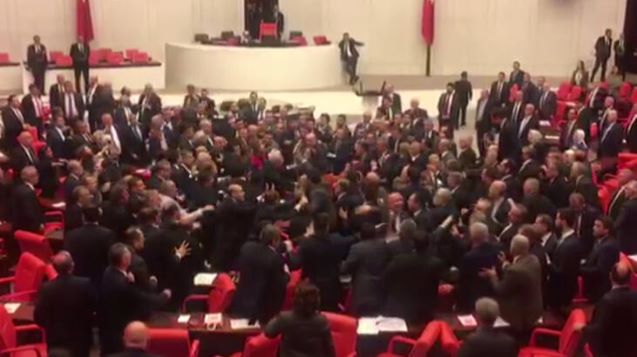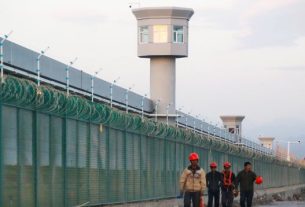ANKARA / ISTANBUL / WASHINGTON — Turkey’s disinformation bill is one step closer to being signed into law, despite protests by the country’s media.
Parliamentary debate on the “proposal on the amendment of the press law and other laws” started Tuesday.
The Turkish government says the bill, suggested in May by the ruling Justice and Development Party (AKP) and its alliance partner, the Nationalist Movement Party (MHP), is needed to tackle the “serious threat” from disinformation.
The draft of 40 articles includes punishments for “spreading misleading information” on national security, public order and health in an attempt to spread panic or fear; requirements for social media companies to appoint Turkish representatives to handle requests related to content removal; a new committee to handle press accreditation; and a provision making digital media eligible to receive state advertising revenue.
President Recep Tayyip Erdogan first suggested legislation on disinformation after his government was criticized on social media over its handling of wildfires in Turkey’s Mediterranean and Aegean coastal cities last year.
“Personally, I do not have a positive view of social media, and I believe that with the opening of the parliament, it is necessary to work on new legislation on social media,” Erdogan said in a TV interview in August 2021.
But journalists warn the provisions are vaguely worded and that the proposed bill could be used to repress critics.
“The public will be silenced, and the journalists will censor themselves. Self-censorship, which already exists, will become more widespread, and freedom of expression will be completely stifled by this law,” Pinar Turenc, president of Turkey’s Press Council, told VOA.
Editorial independence
Critics warn that provisions in Article 29, which focuses on “misleading information,” could be used to further restrict independent news and social media as Turkey draws near to presidential and parliamentary elections in 2023.
“We are faced with a blanket bill that aims to silence not only the digital media and the press but also the dissidents before the 2023 elections by intimidating them,” Yaman Akdeniz, a cyberlaw professor at Istanbul Bilgi University, told VOA.
“Because of their news articles, media outlets will face investigations for the crime of disinformation, and the journalists will be prosecuted,” Akdeniz said.
Kemal Aktas, head of the Parliamentary Correspondents Association, raised concerns that the bill could make political reporting and access to sources difficult.
“The bill mentions the terms of ‘public order, national security and public health,’ but it is unclear where these terms begin and end,” Aktas told VOA. “Because it is unknown how a prosecutor or a judge will evaluate these terms, we think there will be great difficulties in covering political news.”
The founder of Yeniden TV, Aysegul Dogan, said the bill risked eroding journalists’ editorial independence.
“Are we going to cover news and ask questions by thinking, ‘If I write like this or ask this, will I create anxiety, panic, or fear?’ We are talking about a legal regulation that should worry everyone who uses social media as much as journalists,” Dogan told VOA, adding that it could also affect citizen journalists.
Ahmet Ozdemir, the ruling AKP’s deputy for Kahramanmaras city, dismissed the criticism, saying that provisions in Article 29 have “nothing to do” with journalists.
“Why would a press member knowingly and willingly spread false news among the public? Why would his reputation be damaged? It is not technically possible for a press member to be the subject of this crime,” Ozdemir said during the parliamentary debate.
In a separate event, Fahrettin Altun, communications director of the Turkish presidency, spoke more widely at a symposium Tuesday on the need to protect against digital threats.
“It is not up for debate to exclude any area from the reach of the law,” Altun said. “We prioritize and address security issues in the cyber world in the same ways that we prioritize and address security issues in the real world.”
Digital media
Turkish media have also objected to parts of the bill that would allow news websites to receive public advertising revenue and would establish a new committee to issue press cards.
Some journalist associations said that allowing websites to receive revenue from the state-run Press Advertising Agency (BIK) could adversely affect local newspapers. With no additional budget, the revenue will have to stretch further, which could force some papers to downsize, the groups said in a statement Tuesday.
Advocacy groups including Reporters Without Borders have previously criticized BIK’s criteria for allocating official revenue, saying it is “liable to give rise to arbitrary practices that deprive outspoken media outlets of advertising revenue.”
A spokesperson for BIK told VOA in September that the agency works within the regulations that govern it, and its decisions “are completely objective.”
Similarly, journalism unions objected to provisions concerning media accreditation.
The proposed legislation says press cards will be granted by a nine-member committee, five of whose members are appointed by the directorate of communications. The other four will come from journalism organizations.
Gokhan Durmus, chair of the Journalists Union of Turkey, objected that the committee will be controlled by bureaucrats instead of journalism organizations. “The unions should issue the press card, as in the rest of Europe,” he said.
As long as a government is hostile to the independent media, press cards do not provide security for journalists, Durmus added.
“The authorities do not look at the card in the journalist’s pocket. They look at what news the journalist came to cover. And if the news is not wanted to be made public, the journalist is beaten, detained, tried at the court or arrested,” Durmus told VOA.
With AKP and MHP holding a majority in parliament, the bill is expected to pass. The main opposition Republican People’s Party has voiced its opposition and has said it will appeal to the Constitutional Court if the law is enacted.___VOANews





